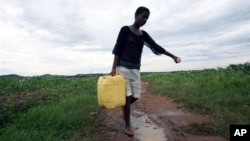HARARE —
In Zimbabwe, the Swiss government has given $6 million to the U.N. Children's Fund to improve the country’s water and sanitation. The African country still has significant numbers of people sharing water sources with animals, and an even greater number who do not have access to a working bathroom.
In Zimbabwe’s capital, luxury cars of all models are seen in the streets. But just outside the capital, there is poverty. It gets worse in the rural areas where some people go their entire life without a decent water supply and have to mostly defecate in the open.
Zimbabwe water minister Samuel Sipepa Nkomo sums up the situation in his country.
“Rural water supply and sanitation challenges are well documented. We hope to reduce and ultimately eliminate the dehumanizing situation where rural dwellers have to share water sources with animals,” Nkomo said.
But he did not give a time frame for that improvement.
Nkomo spoke after Switzerland gave $6 million to UNICEF to improve Zimbabwe's rural water supply and sanitation. But given that 75 percent of Zimbabwe’s rural population does not have access to clean water, that money may just be a figurative drop in the ocean.
After its independence from Britain in 1980, Zimbabwe’s social-services sector became the envy of most developing countries. But it did not last, notes Swiss ambassador to Zimbabwe Luciano Lavizzari.
“Unfortunately, all these successes dramatically collapsed within a decade and Zimbabwe became a case study of a nation that has reversed its gains in the water sector. Currently we have a very poor situation, particularly in the country: 2.1-million people do not have access to improved drinking water sources ... and I have been told that one-third of the population practices open defecation. This is of course a very difficult situation.” Lavizzari said.
The U.N. Children's Fund says the Swiss contribution will help about a half-million Zimbabweans get access to safe water and sanitation.
The UNICEF acting head in Zimbabwe, Marc Rubin, says this is important given Zimbabwe's vulnerability to waterborne diseases.
“In this country, we know too well the cost of not plugging access gaps in water and sanitation. The 2008 cholera outbreak resulted in 98,000 cases and over 4,000 deaths. Even more insidious is the price Zimbabwe pays as a result of diarrhea; over 3,000 deaths are attributed to the disease every year, making it one of the top 10 diseases affecting under-five [year-old] children," Marc said.
The UNICEF boss suggests Zimbabwe increase investment toward building a safe water supply and sanitation. But without help from the international community, it is unclear where the country's cash-strapped government could find the money.
In Zimbabwe’s capital, luxury cars of all models are seen in the streets. But just outside the capital, there is poverty. It gets worse in the rural areas where some people go their entire life without a decent water supply and have to mostly defecate in the open.
Zimbabwe water minister Samuel Sipepa Nkomo sums up the situation in his country.
“Rural water supply and sanitation challenges are well documented. We hope to reduce and ultimately eliminate the dehumanizing situation where rural dwellers have to share water sources with animals,” Nkomo said.
But he did not give a time frame for that improvement.
Nkomo spoke after Switzerland gave $6 million to UNICEF to improve Zimbabwe's rural water supply and sanitation. But given that 75 percent of Zimbabwe’s rural population does not have access to clean water, that money may just be a figurative drop in the ocean.
After its independence from Britain in 1980, Zimbabwe’s social-services sector became the envy of most developing countries. But it did not last, notes Swiss ambassador to Zimbabwe Luciano Lavizzari.
“Unfortunately, all these successes dramatically collapsed within a decade and Zimbabwe became a case study of a nation that has reversed its gains in the water sector. Currently we have a very poor situation, particularly in the country: 2.1-million people do not have access to improved drinking water sources ... and I have been told that one-third of the population practices open defecation. This is of course a very difficult situation.” Lavizzari said.
The U.N. Children's Fund says the Swiss contribution will help about a half-million Zimbabweans get access to safe water and sanitation.
The UNICEF acting head in Zimbabwe, Marc Rubin, says this is important given Zimbabwe's vulnerability to waterborne diseases.
“In this country, we know too well the cost of not plugging access gaps in water and sanitation. The 2008 cholera outbreak resulted in 98,000 cases and over 4,000 deaths. Even more insidious is the price Zimbabwe pays as a result of diarrhea; over 3,000 deaths are attributed to the disease every year, making it one of the top 10 diseases affecting under-five [year-old] children," Marc said.
The UNICEF boss suggests Zimbabwe increase investment toward building a safe water supply and sanitation. But without help from the international community, it is unclear where the country's cash-strapped government could find the money.




